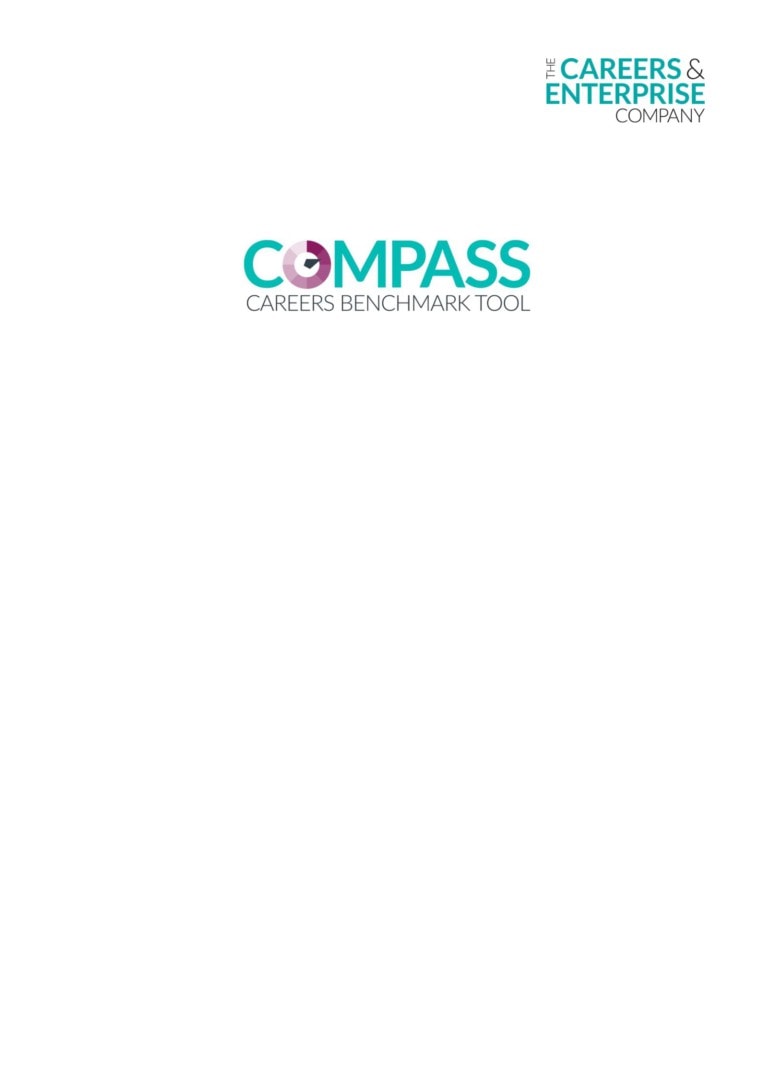Compass questions
Compass helps you understand how your school's career education and
guidance compares to best practice. You can identify strengths and
discover areas for improvement.
To get the best results, you will need to know details of student numbers
in your year groups, and it is a good idea to talk to colleagues involved in
careers.
This offline version of the tool can help you to gather the information you
need - the online tool also allows you to save an evaluation and return to
it later.
Company and the Gatsby Charitable Foundation.
Benchmarks.
Introduction - Your school
Is this the school you’re evaluating now?
Choose and confirm your school from the list.
Select your job title
Select your job title from a list, or enter manually.
Which year groups attend your school?
•
Below year 6
Enter pupil numbers
•
Year 6
Enter pupil numbers
•
Year 7
Enter pupil numbers
•
Year 8
Enter pupil numbers
•
Year 9
Enter pupil numbers
•
Year 10
Enter pupil numbers
•
Year 11
Enter pupil numbers
•
Year 12
Enter pupil numbers
•
Year 13
Enter pupil numbers
Benchmark 1 - Stable careers programme
These questions are about the Gatsby benchmark for a 'stable careers
programme'.
Schools and colleges should have an established programme of careers
education and guidance that is known and understood by students,
parents, teachers, governors and employers.
1.1 Does your school have a careers programme that:
Is written down?
Yes | No | Don’t know
Is approved by the board of governors?
Yes | No | Don’t know
Has the explicit backing of senior leadership?
Yes | No | Don’t know
Has resources/funding allocated to it?
Yes | No | Don’t know
Is regularly monitored?
Yes | No | Don’t know
Has both strategic and operational elements?
Yes | No | Don’t know
1.2 Does your school publish its careers programme on its
website?
Yes
No
Don’t know
IF 1.2 No/ Don’t know: skip to 1.4
IF 1.2 YES: skip to 1.3
1.3 Is there information on your website about the career
programme aimed specifically at:
Students?
Yes | No | Don’t know
Teachers?
Yes | No | Don’t know
Employers?
Yes | No | Don’t know
Parents/carers?
Yes | No | Don’t know
1.4 Does your school evaluate the effectiveness of its careers
programme at least every three years?
Yes
No
Don’t know
IF 1.4 No/ Don’t know: skip to 1.6
IF 1.4 YES: skip to 1.5
1.5 Does the evaluation of your careers programme take into
account feedback from:
Students?
Yes | No | Don’t know
Teachers?
Yes | No | Don’t know
Employers?
Yes | No | Don’t know
Parents/carers?
Yes | No | Don’t know
1.6 Does your school have a lead person with strategic
responsibility for overseeing your school’s careers programme?
Yes
No
Don’t know
Benchmark 2 - Learning from career and labour market
information
These questions are about the Gatsby Benchmark around the importance
of 'Learning from career and labour market information'.
Every student, and their parents, should have access to good-quality
information about future study options and labour market opportunities.
They will need the support of an informed adviser to make best use of
available information.
2.1 Approximately what proportion of students have accessed and
used up-to-date information about career paths and the labour
market by:
Benchmark guidance is from 14+ so this should be the default option
shown. If no pupil numbers entered in Years 7-9, show ‘age of 16’
instead. If no pupil numbers entered in Years 7-11, show ‘age of 18’
instead.
The age of 14
Enter proportion
The age of 16
Enter proportion
The age of 18
Enter proportion
Lowest relevant age is the question which is scored
• None
• A few (1-25%)
• Some (26-50%)
• Most (51-75%)
• Overwhelming majority (76-99%)
• All
• Don’t know
2.2 Does your school encourage parents and carers to access and
use up-to-date information about the labour market, future study
options and career paths to inform the support they give to their
children?
Yes
No
Don’t know
Benchmark 3 - Pupil needs
These questions are about the Gatsby Benchmark around 'addressing the
needs of each student'.
Opportunities for advice and support need to be tailored to the needs of
each student. A school’s careers programme should embed equality and
diversity considerations throughout.
3.1 How strongly do you agree or disagree that your school's
career programme addresses the following issues?
It actively seeks to raise the aspirations of all students
Rate on scale of 1 (strongly disagree) - 5 (strongly agree)
It challenges stereotypical thinking (in terms of gender etc)
Rate on scale of 1 (strongly disagree) - 5 (strongly agree)
3.2 Does your school?
Keep systematic records on each pupil’s experiences of career and
enterprise activity?
Yes | No | Don’t know
Enable pupils to have access to accurate records about their own careers
and enterprise experiences?
Yes | No | Don’t know
Collect and maintain accurate data for each pupil on their destinations for
3 years after they leave your school?
Yes | No | Don’t know
Share accurate and timely data with the local authority on pupil
transitions and destinations?
Yes | No | Don’t know
Work proactively with the local authority and careers advisers around the
careers guidance and progression of vulnerable and special educational
needs and disability (SEND) students?
Yes | No | Don’t know
Benchmark 4 - Curriculum
These questions are about the Gatsby Benchmark recommending 'Linking
curriculum learning to careers'.
All teachers should link curriculum learning with careers. STEM subject
teachers should highlight the relevance of STEM subjects for a wide range
of future career paths.
4.1 By the time they leave school, approximately what proportion
of students have experienced curriculum learning that highlights
the relevance of their subject to future career paths?
English Enter an approximate percentage
• None
• A few (1-25%)
• Some (26-50%)
• Most (51-75%)
• Overwhelming majority (76-99%)
• All
• Don’t know
Maths Enter an approximate percentage
• None
• A few (1-25%)
• Some (26-50%)
• Most (51-75%)
• Overwhelming majority (76-99%)
• All
• Don’t know
Science Enter an approximate percentage
• None
• A few (1-25%)
• Some (26-50%)
• Most (51-75%)
• Overwhelming majority (76-99%)
• All
• Don’t know
PSHE Enter an approximate percentage
• None
• A few (1-25%)
• Some (26-50%)
• Most (51-75%)
• Overwhelming majority (76-99%)
• All
• Don’t know
Benchmark 5 - Employer encounters
These questions are about the Gatsby Benchmark recommending
'Encounters with employers and employees'.
Every student should have multiple opportunities to learn from employers
about work, employment and the skills that are valued in the workplace.
This can be through activities including visiting speakers, mentoring and
enterprise schemes.
5.1 Please select the years during which 76-100% of students
have at least one encounter with an employer or employee.
Below year 6
Year 6
Year 7
Year 8
Year 9
Year 10
Year 11
Year 12
Year 13
Above Year 13
5.2 What proportion of your students have at least one encounter
with an employer every year they are at school?
• None
• A few (1-25%)
• Some (26-50%)
• Most (51-75%)
• Overwhelming majority (76-99%)
• All
• Don’t know
5.3 On average, how many encounters with an employer will your
students have had by the time they leave school?
Choose an average number from 0 to ‘10 or more’
5.4 How many businesses will you involve in careers activity in
the current academic year?
Choose a number from 0 to ’10 or more’
Benchmark 6 - Workplace experiences
These questions are about the Gatsby Benchmark recommending
'Experiences of workplaces'.
Every student should have first-hand experiences of the workplace
through work visits, work shadowing and/or work experience to help their
exploration of career opportunities, and expand their networks.
IF 0 entered for Year 7-11 pupil numbers: skip 6.1
6.1 Approximately what proportion of students have had an
experience of a workplace by the end of Year 11?
• None
• A few (1-25%)
• Some (26-50%)
• Most (51-75%)
• Overwhelming majority (76-99%)
• All
• Don’t know
IF 0 entered for Year 12-13 pupil numbers: skip 6.2
6.2 During Years 12 and 13 specifically, what proportion of
students have an experience of a workplace?
• None
• A few (1-25%)
• Some (26-50%)
• Most (51-75%)
• Overwhelming majority (76-99%)
• All
• Don’t know
Benchmark 7 - Educational encounters
These questions are about the Gatsby Benchmark recommending
'Encounters with further and higher education'.
All students should understand the full range of learning opportunities
that are available to them. This includes both academic and vocational
routes and learning.
7.1 By the time they leave school, approximately what proportion
of students have had the following experiences?
Meaningful encounters with Sixth Form Colleges?
• None
• A few (1-25%)
• Some (26-50%)
• Most (51-75%)
• Overwhelming majority (76-99%)
• All
• Don’t know
Information about the full range of apprenticeships, including higher level
apprenticeships?
• None
• A few (1-25%)
• Some (26-50%)
• Most (51-75%)
• Overwhelming majority (76-99%)
• All
• Don’t know
Meaningful encounters with Further Education Colleges?
• None
• A few (1-25%)
• Some (26-50%)
• Most (51-75%)
• Overwhelming majority (76-99%)
• All
• Don’t know
Meaningful encounters with Independent Training Providers?
• None
• A few (1-25%)
• Some (26-50%)
• Most (51-75%)
• Overwhelming majority (76-99%)
• All
• Don’t know
Meaningful encounters with universities
• None
• A few (1-25%)
• Some (26-50%)
• Most (51-75%)
• Overwhelming majority (76-99%)
• All
• Don’t know
IF pupil numbers entered for Year 12 or 13:
At least two visits to a university?
• None
• A few (1-25%)
• Some (26-50%)
• Most (51-75%)
• Overwhelming majority (76-99%)
• All
• Don’t know
Benchmark 8 - Personal guidance
These questions are about the Gatsby Benchmark around the need for
'personal guidance' for students.
Every student should have opportunities for guidance interviews with a
career adviser, who could be internal (a member of school staff) or
external, provided they are trained to an appropriate level. These should
be available whenever significant study or career choices are being made.
They should be expected for all students but should be timed to meet
their individual needs.
IF 0 entered for Year 7-11 pupil numbers: skip 8.1
8.1 What proportion of students have had an interview with a
qualified careers adviser by the end of Year 11?
• None
• A few (1-25%)
• Some (26-50%)
• Most (51-75%)
• Overwhelming majority (76-99%)
• All
• Don’t know
IF 0 entered for Year 12-13 pupil numbers: skip 8.2
8.2 What proportion of students have had at least two interviews
with a qualified careers adviser by the end of Year 13?
• None
• A few (1-25%)
• Some (26-50%)
• Most (51-75%)
• Overwhelming majority (76-99%)
• All
• Don’t know












